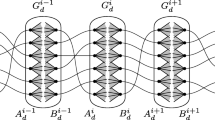Abstract
Consider a digraph where the vertices represent people and an arc (i,j) represents the possibility of i giving a gift to j. The basic question we pose is whether there is an anonymity-preserving “gift assignment” such that each person makes and receives exactly one gift, and such that no person i can infer the remaining gift assignments from the fact that i is assigned to give a gift to j. We formalize this problem as a graph property involving vertex disjoint circuit covers, give a polynomial algorithm to decide this property for any given graph and provide a computational validation of the algorithm.
Preview
Unable to display preview. Download preview PDF.
Similar content being viewed by others
References
Boyd, A.V., Ridley, J.N.: The return of Secret Santa. Mathematical Gazette 85(503), 307–311 (2001)
Chaum, D.: The dining cryptographers problem: unconditional sender and recipient untraceability. Journal of Cryptology 1(1), 65–75 (1988)
Duncan, B.: Secret Santa reveals the secret side of giving. Technical Report 0601, University of Colorado at Denver (2006)
Fagin, R., Halpern, J.Y., Moses, Y., Vardi, M.Y.: Reasoning about Knowledge. MIT Press, Cambridge (1995)
Fourer, R., Gay, D.: The AMPL Book. Duxbury Press, Pacific Grove (2002)
ILOG. ILOG CPLEX 10.1 User’s Manual. ILOG S.A., Gentilly, France (2006)
McGuire, K.M., Mackiw, G., Morrell, C.H.: The Secret Santa problem. Mathematical Gazette 83(498), 467–472 (1999)
Penrice, S.: Derangements, permanents and christmas presents. American Mathematical Monthly 98(7), 617–620 (1991)
Pinkham, R.: The Secret Santa problem revisited. Mathematical Gazette 85(502), 96–97 (2001)
Schrijver, A.: Combinatorial Optimization: Polyhedra and Efficiency. Springer, Berlin (2003)
Tel, G.: Cryptografie, Beveiliging van de digitale maatschappij. Addison-Wesley, Reading (2002)
Verelst, J.: Secure computing and distributed solutions to the Secret Santa problem. Master’s thesis, Computer Science Dept., University of Utrecht (2003)
White, M.: The Secret Santa problem. Rose-Hulman Institute of Technology Undergraduate Math Journal 7(1) (paper 5) (2006)
Secret Santa. Wikipedia (2006), http://en.wikipedia.org/wiki/Secret_Santa
Author information
Authors and Affiliations
Editor information
Rights and permissions
Copyright information
© 2008 Springer-Verlag Berlin Heidelberg
About this paper
Cite this paper
Liberti, L., Raimondi, F. (2008). The Secret Santa Problem. In: Fleischer, R., Xu, J. (eds) Algorithmic Aspects in Information and Management. AAIM 2008. Lecture Notes in Computer Science, vol 5034. Springer, Berlin, Heidelberg. https://doi.org/10.1007/978-3-540-68880-8_26
Download citation
DOI: https://doi.org/10.1007/978-3-540-68880-8_26
Publisher Name: Springer, Berlin, Heidelberg
Print ISBN: 978-3-540-68865-5
Online ISBN: 978-3-540-68880-8
eBook Packages: Computer ScienceComputer Science (R0)



